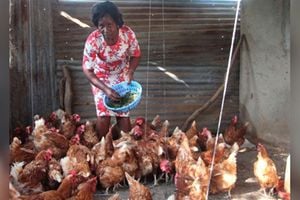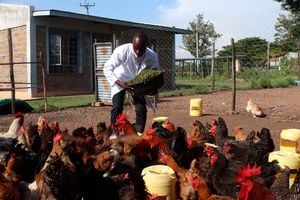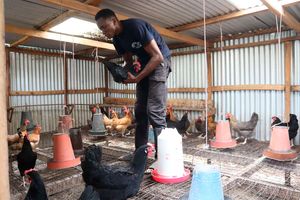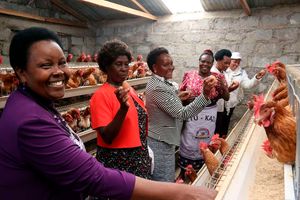
Ms Jane Ndiritu, the founder Dheiton Farm in Nyandarua.
Punished by the vagaries of weather, Daniel Wambugu and Jane Ndiritu abandoned crops in favour of poultry production. Their chicken business has attracted the attention of local and global organisations keen on agribusiness.
Started in 2018, Dheiton Ventures Ltd is becoming a resource centre and training ground for farmers in dry parts of Laikipia and Nyandarua counties.
“We have 15,000 layers but our target is 300,000 in five years. We have also contracted 200 small-scale farmers who have had basic poultry managerial training,” Wambugu says.
“Our bigger dream is adding value to eggs. Before that, we must be sure of sustained production. It is not okay to introduce a product and then fail customers.”
He adds that Dheiton Ventures’ customers are in Nairobi, Nakuru, Nyahururu, Isiolo and other towns. Wambugu is the company’s Enterprise Development Director.
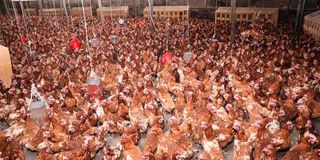
Layers at Dheiton Farm in Nyandarua.
Ms Ndiritu, the CEO, says they tried many crops on the 15 acres but failed.
“The rains would disappear, leading to losses. We had to change gears. We wanted a business that would provide education to locals who would use the skills to improve their lives. We had to take a risk,” she says.
Juan Echanove, CARE International USA Vice President, says such ventures are good for food security.
CARE International is an agency that helps improve agribusiness and nutrition.
Small-scale farmers
“The firm has shown that there are better ways of promoting the welfare of small-scale farmers. It is a good case of a healthy value chain. Care International can work with Dheiton for the benefit of smallholder farmers,” Echanove says.
“This farm has encouraged us to partner with the national and Nyandarua county authorities on the best methods of addressing food insecurity in dry regions. It is also promoting climate-smart farming.”
Apart from eggs, Dheiton Ventures also sells manure and live birds.
Before starting the poultry project, Wambugu and Ndiritu had tried a hand in tree tomato production. They abandoned the venture on realising it was not benefiting the community due to high water demand.
“We settled on poultry after doing some research locally and abroad. It involved visiting research institutions, successful farmers and experts,” Ndiritu says, adding that keeping chickens is not labour-intensive or time-consuming.
Every chicken house on the farm is capable of holding 5,000 layers.
Wambugu says they settled for layers because they are not as challenging to keep as broilers. He adds that eggs and the birds themselves have a guaranteed market and the turnaround is just six weeks.
“With layers, one has a steady income for about a year and a half. With time, a farmer can have a big network of buyers. We dispose of the layers every 24 months and restock. For now, we are offloading 15,000 layers to be left 5,000,” he says.
Every structure has a layers’ ward, where birds appearing sick or brooding are kept.
When it is hot, some birds develop signs of brooding but recover in two to three days when placed in the ward.
The disposed layers are normally replaced in just a month. Dheiton started with 8, 000 layers.
Workers at the farm monitor the layers from day one, to brooding, laying to the time they are exhausted and sold for slaughter. Dheiton Ltd specialises in ISA Brown layers.
Contract farming
CARE-Kenya Project Manager, Thomas Ongogo, says lack of a structured market has frustrated many farmers.
“Dheiton Ventures has addressed this through contract farming. Poultry production is not disruptive. One can rear chickens and still engage in other activities,” he says.
The farm buys day-old chicks and broods them for a month. They start laying eggs at 17 to 18 weeks.
Dr Teresiah Ndung’u, the County Livestock Director, advises poultry farmers to stick to best management practices and always consult experts.

